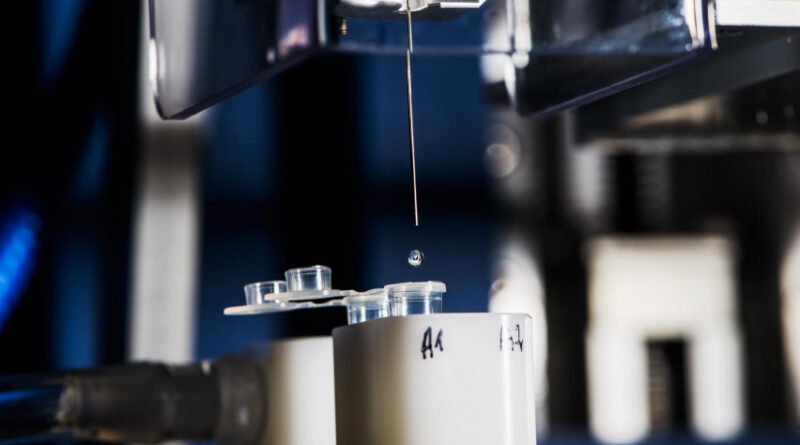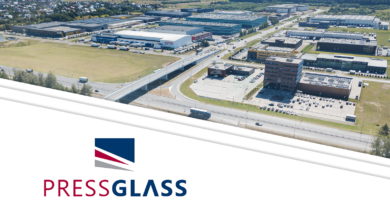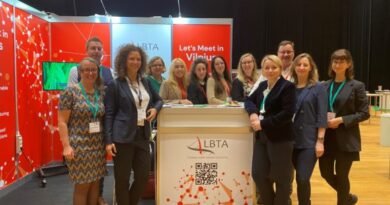5 things to know about Lithuania’s life sciences industry
Lithuania’s life sciences sector has been rising to prominence internationally for the past decade. Boosted by world-leading biotechnology research and strong educational institutions that supply businesses with top-notch talent, the sector is accelerating faster than almost anywhere else in Europe. Growing by a record 87% in 2020, Lithuania’s robust life sciences ecosystem, which includes both established players and up-and-coming startups, contributes an impressive 2.5% to Lithuania‘s GDP.
Here are five things to know about Lithuania’s life sciences sector.
Lithuania is a site of groundbreaking research
Lithuania might be a small country, but its scientific footprint is anything but – as evidenced by the buzz surrounding the numerous discoveries made by Lithuanian biochemists. Furthermore, Lithuanian labs often play a pivotal role in scientific advancement, especially in the field of molecular biotechnology.
Among the country’s top scientists, the most well-known is Prof. Virginijus Šikšnys – one of the pioneers of CRISPR-Cas9 genome editing technology. This powerful tool, dubbed “gene scissors”, allows researchers to easily alter DNA sequences. At some point down the road, the CRISPR-Cas9 technology could allow scientists to achieve such feats as developing effective cures for chronic diseases or even resurrecting species that have long gone extinct.
Prof. Šikšnys was one of the first to show how the Cas9 protein, found in bacteria, can be used to cut and paste genes together in a brand new way. For his contribution to this revolutionary technology, the Lithuanian professor was awarded the coveted Kavli Prize in Nanoscience. Prof. Šikšnys continues his work at the Life Sciences Centre of Vilnius University (VU LSC), where he heads the Protein-DNA Interaction lab – a research team with a mission to perfect the CRISPR-Cas9 method.
Meanwhile, Prof. Saulius Klimašauskas, another world-renowned Lithuanian biochemist, is conducting world-class biological research at his Biological DNA Modification lab at VU LSC. Prof. Klimašauskas’ work focuses on epigenetic processes – those that alter gene activity without changing the DNA sequence in cells. Epigenetic changes are associated with a wide range of diseases, including nearly all types of cancer, which makes epigenetics research instrumental in developing novel drugs and diagnostic methods.
A recipient of the prestigious European Research Council grant, Prof. Klimašauskas investigates the roles that particular proteins play in epigenetic DNA modifications. This is key to advancing our understanding of human development and disease.
“Some of the world’s leading researchers in genomics and epigenetics work in Vilnius. International grants and publications in the most prominent scientific journals demonstrate that Lithuania possesses top-tier scientific expertise.”
Prof. Gintaras Valinčius, Director of VU LSC.
Top-level talent anchors the sector’s success
Despite being a country with a population of only 2.8 million, Lithuania has no shortage of talented life sciences professionals. More than 15,000 specialists work in the sector – a number that is growing every year thanks to six universities offering biotech-related study programmes.
Arguably, Lithuania’s biggest hothouse for life sciences talent is the Life Sciences Centre of Vilnius University. A central feature in the country’s research landscape, the LSC is a 1,500-strong team of budding and experienced scientists alike, including over 1,000 students of all academic levels and more than 140 PhDs.
“The student to faculty ratio here is nearly unparalleled. There is one member of academic staff for every four students, which means that both graduate and undergraduate students receive plenty of attention from the faculty”.
Prof. Valinčius
The young scientists themselves often celebrate significant achievements. Since 2015, teams of Vilnius University students have been participating in iGEM – an annual international synthetic biology competition. One of the largest such events in the world, iGEM has hundreds of student teams presenting projects that tackle global issues from disease prevention to environmental protection. VU teams have an impressive iGEM track record, bringing in gold medals and wins in multiple categories every year, as well as beating students from universities like Harvard, Oxford, and MIT on two occasions to become winners of the Grand Prize.
Lithuania also boasts an impressive number of women in science – 57% of the country’s scientists and engineers are female. The life sciences sector is no exception. Named one of the most promising young researchers in the world by L’Oréal Foundation and UNESCO in 2019, neuroscientist Dr. Urtė Neniškytė is at the top of a long list of accomplished Lithuanian women in life sciences. After completing her PhD at the University of Cambridge, Dr. Neniškytė established a lab at Vilnius University, where her team investigates early brain development. Her research could advance our understanding of the causes of autism spectrum disorder, schizophrenia, and epilepsy.
Life sciences industry generates more than 2% of Lithuania’s GDP
With a ninefold increase over the last decade, the revenue of Lithuania’s biotechnology companies soared to nearly €2 billion in 2020. This marked a whopping 87% increase from the previous year. The biggest contributors to this outstanding result were the prominent multinational life sciences players that have established manufacturing and R&D presence in Lithuania.
The world’s biggest scientific equipment and services provider Thermo Fisher Scientific set foot in Lithuania in 2010, when the company acquired the leading Lithuanian biotech firm Fermentas for $260 million. Currently, Thermo Fisher’s facility in Vilnius employs more than 1,300 specialists, including over 100 scientists that develop molecular, protein, and cellular biology products. This makes the site one of the largest private R&D centres in the region.
The pharmaceutical giant Teva also established a branch in Lithuania by acquiring a local company, Sicor Biotech, in 2004. Now named Teva Baltics, the facility in Vilnius conducts biological, biochemical, and genetic research to produce biopharmaceutical drugs. Having built a global reputation for developing drugs for cancer patients, Teva Baltics exports most of its products to the EU, US, and Japan.
Home-grown life sciences companies have also achieved success without foreign investment. One such company is Northway Biotech, a contract developer and manufacturer of biopharmaceuticals that provides end-to-end drug production services for global clients. Having quadrupled its profits over the last five years, the company generated over €45 million of revenue in 2020 and recently opened a branch in Boston.
The life sciences industry generated 2.5% of Lithuania’s GDP in 2020. It’s a result of a decade’s worth of fast-paced growth – over the last ten years, the value of Lithuania’s industrial biotechnology output increased 4.5 times faster than the EU average. Lithuania hopes to maintain this momentum, aiming to increase the GDP contribution of the sector to 5% by 2030.
Lithuania is home to biotech startups ready to change the world
Global biotech giants aside, Lithuania is also home to more than 60 life sciences startups and spin-offs, adding around ten or so every year. This rate of growth, however, is set to change, as the country aims to increase the number of such enterprises to at least 500 by 2030. With Lithuania’s favourable business environment, extensive R&D competencies, and a large pool of science professionals, this seems like an ambitious yet achievable goal.
One of the brightest stars of the Lithuanian life sciences startup scene is CasZyme, which develops CRISPR-based molecular tools for gene editing. Commercialising the revolutionary “gene scissors” technology pioneered in Lithuania, the nanotools the startup provides for researchers and businesses have a myriad of applications, from correcting genetic defects and treating diseases like cancer and hepatitis B, to improving the resilience of crops.
Another well-known name is Droplet Genomics – a startup commercialising droplet microfluidics technology. Because of its unparalleled throughput, droplet microfluidics enables researchers to study single cells and molecules. Experiments performed at such resolution allow scientists to uncover new facets of human biology, speed up drug discovery, and even enable personalised medicine. Producing hardware systems, consumables and software solutions for droplet microfluidics research, Droplet Genomics recently raised €1 million of seed funding that will allow the startup to accelerate the development of new products.
Lithuania’s world-class research infrastructure is complemented by membership in Europe’s elite molecular biology club
Strong academic institutions are the backbone of Lithuania’s life sciences industry, but the ecosystem is also bolstered by robust research infrastructure. With more than €1 billion invested in life sciences infrastructure over the past decade, there are now 8 research centres in Lithuania dedicated exclusively to this field.
The largest among them is the Life Sciences Centre of Vilnius University. Since opening in 2016, the 24,000 square-metre teaching and research facility has become a hub for collaboration across biotechnology and molecular medicine. The LSC has recently got a boost from signing a partnership agreement with the European Molecular Biology Laboratory (EMBL) – Europe’s flagship life sciences research organisation.
“In 2020, the EMBL signed a remote partnership agreement with the Life Sciences Centre, where the EMBL Partnership Institute for Genome Editing Technologies was established. It employs six international, high-profile research group leaders focusing on developing and applying genome technologies – a field our scientists have contributed to greatly. Our vision is for Lithuania to become the regional, and eventually the continental, leader in gene editing.”
Prof. Gintaras Valinčius, Director of the LSC
Lithuania’s technology parks and valleys are also an integral part of the country’s excellent life sciences infrastructure. Purpose-built to grow research-driven businesses, they provide a supportive environment and collaborative opportunities for promising startups and established industry players.
Among the youngest of such sites is the Vilnius City Innovation Industrial Park – an R&D hub with a growing cluster of life sciences companies at its core. The park’s latest project is a €27 million investment to build a 3D bioprinting plant for Stem Cell Research Center – a Lithuanian biotechnology company. The facility will develop and produce artificial tissues, making Lithuania part of the transformation of healthcare in the following decades.




